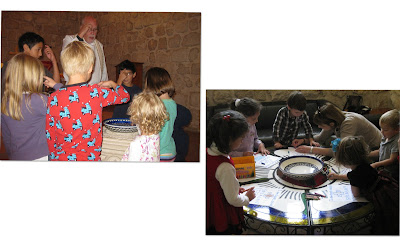by Fred & Gloria Strickert
"I give thanks to my God always for you because of the grace of God that has been given you in Christ Jesus. . . ."
(1 Corinthians 1:4 --Epistle for Advent 1)
We give thanks for the blessings of
family,
friends,
support congregations,
all the people back in the USA who celebrate Thanksgiving in a traditional way and make it possible for us to be here in Jerusalem.

In this part of the world where the sharing of food is an essential part of relationships, we had several occasions for celebrating thanksgiving, both with traditional turkey and stuffing and with Middle Eastern salads and other dishes.
More than food, Thanksgiving is about community.
And when living in a foreign country, we look for times like this when we can gather as community.
On Friday evening together at the home of Mark and Susanne Brown on the LWF campus.
We give thanks for the blessing of community.
We give thanks for the blessing of community.
Joining at Thursday noon at the Tantur Ecumenical Center with colleagues, Kjell & Inger Jonasson from Sweden and with Chris Cowan, an American Ecumencial Accompaniers in the South Hebron hills.
As I remember Thanksgivings in the States, the biggest distraction from the feast was the football game on TV. Here the moment we filled our plates and sat down at the table on Thanksgiving noon, my cell phone rang with a text message:
"Demolition of mosque and several residential buildings in Um-Fagareh!"

Holding loud speaker from
destroyed mosque.
Photos from Maan News
Two Palestinian women arrested trying to defend home against fifty soldiers accompanying bulldozer. One woman has leg broken in the scuffle.
Less than an hour earlier, a text message had announced the demolition of a Palestinian residence and animal shelter in Susiya.
The demolition order lies amidst the rubble.
Picking up the pieces.
This is one of the poorest areas in the West Bank. Some villagers live in caves.
Attempts to bring electricity to village are periodically destroyed.
Our Thanksgiving dinner companion Chris was visibly shaken by the news. Her assignment with the Ecumencial Accompaniers these three months has been in the South Hebron hills, where she has gotten to know well the villagers at Susiya and Um-Fagareh. Click here to read her own refections...As the sole American EAPPI, her four teammates had given Chris Thanksgiving Day off to relax and to recharge. This has been a taxing assignment. Settlers had regularly been harrassing the villagers all through the fall.
Yet this was not the action of lawless settlers. Home Demolitions are carried out by the Israeli government, the same Israeli government that builds and expands West Bank and East Jerusalem settlements in defiance of every nation of the world, including the USA & clear evidence that Israel remains in control of Palestinian life in the West Bank. 24,813 Palestinian houses have been systematically demolished since 1967 according to the Israeli Human Rights organization Israel Committee Against Home Demolitions. Click on this ICAHD link to learn more about this flagrant abuse against human dignity.
Another home demolished.
CNN, Fox news, and the major networks-- always determined to portray Palestinians as terrorists-- don't find home demolitions as sexy enough for news and prefer to report on such things as American Idol stars Scotty McCreery as messing up his lip-sinc during Thanksgiving Parade and Laura Alaina as forgetting words to the National Anthem at the Packers-Lions game. Who wants to hear about home demolitions?
Earlier in the day, yet two other houses were demolished in Beit Hanina, a Palestinian area in East Jerusalem.
The home owner can only watch against such a military display of force.
According to a UN agency, 481 houses have been destroyed in 2011 displacing 887 persons.
Tomorrow in church we light the first Advent Candle-- the candle of hope.
"O that you would tear open the heavens and come down..." (Isaiah 64:1)
"Stir up your power, Lord Christ, and come."
Advent 1 -- Prayer of the Day.
The only Thanksgiving prayer that made sense to us for our Friday community gathering was one written by Brian McLaren:
We thank you, God, for this holiday,.
We have rested, and we think of all those whose lives
Are hard and who enjoy little rest.
We have eaten the fruit of our labors, and we think of those
Who have neither work nor money.
We have feasted, and we think of all whose stomachs
Are hungry and have too little.
We have felt safe and at home, and we think of those
Who live in danger and turmoil, in war and fear, and all
Who have been driven from their homes.
We have been together, and we think of all those
Who are lonely and alone.
We have laughed, and we think of all
Whose hearts are heavy.
We have shared stories, and we think of al
Who need a listening ear.
We have counted our blessings, and we ask
That our gratitude can now be translated
Into the desire to be a blessing to others.
Taize service on Friday
at Redeemer led by
Frere Emile from Taize.
Wait for the Lord
by Fred & Gloria Strickert























